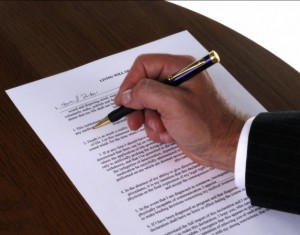 In our online guide to wills and estates, we looked at what a will is, what happens if someone dies without a will and various details concerning a will, as well as how the people named as executors in the will go about administering the person’s estate following their death. But why should you make a will in the first place? Various surveys carried out in recent years have found that between 60 and 70% of UK adults have not made a will, suggesting that people do not think that making a will is particularly important. However, there are a number of key reasons why you should get one.
In our online guide to wills and estates, we looked at what a will is, what happens if someone dies without a will and various details concerning a will, as well as how the people named as executors in the will go about administering the person’s estate following their death. But why should you make a will in the first place? Various surveys carried out in recent years have found that between 60 and 70% of UK adults have not made a will, suggesting that people do not think that making a will is particularly important. However, there are a number of key reasons why you should get one.
A will is the only way of making your wishes known following your death. If you do not make a will, your estate (your money, possessions and property) has to be distributed by law according to the rules of intestacy, which may mean it is distributed completely differently to how you would have wished. If you don’t have any surviving family members then ultimately your entire estate could end up being passed to the Crown (the government).
A will is therefore essential to ensure that you look after and provide for your loved ones. If you don’t leave a will, and you are in a relationship but not married or in a civil partnership, then your partner will not be entitled to anything, regardless of how long you have been a couple. This could lead to serious financial problems for the surviving partner.
Alternatively, if you are separated from your spouse but have not got a divorce and are therefore still married, your estranged spouse would still be entitled to inherit your estate. Changes in family circumstances such as births, deaths, marriages and divorces are often key reasons why people either make a will or amend their will.
Having a will can also reduce the chances of your estate being successfully contested following your death. There are various vehicles that people can use to contest or challenge a will, such as the Inheritance (Provision for Family and Dependents) Act 1975. Whilst having a will cannot prevent challenges altogether, it can significantly reduce the likelihood of successful claims being made. Having a will sets out exactly what you wanted to happen, which hopefully will reduce the chances of family disputes breaking out after your death.
If you have children, it is vitally important to have a will in order to protect them if you die. It is necessary to make arrangements for the children if they are under the age of 18, including the appointment of a guardian and the appointment of somebody to look after their inheritance. Losing their parents will be extremely traumatic for any child, but if they are then left with people who you and they would not have wished them to be left with would make the whole experience even worse.
A will also allows you to choose if you would like to leave any money for charities and can also be helpful for reducing the amount of inheritance tax (IHT) that will have to be paid from your estate following your death. It also allows you to outline what should happen to your pets following your death if you are a pet owner, and gives you the general piece of mind to know that when you do pass away your affairs will be in order and there will be fewer things for those who are left behind to have to worry about. If you don’t leave a will, the process that will subsequently take place will be very stressful and time consuming for your loved ones.
Finally, a will allows you to document what you would like your funeral arrangements to be (such as whether you want a burial or cremation), so that your loved ones aren’t left second guessing what you would have liked to have happened following your death, and details who you want to administer your estate as executor following your death.
For more information about wills and estates, click here to read our online guide.
